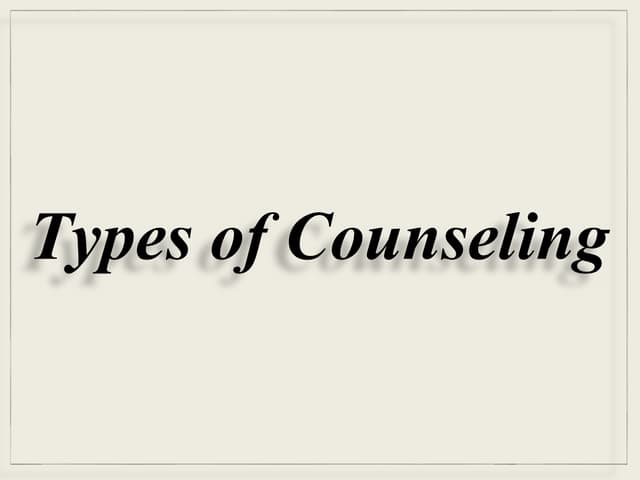Top Situations Couples Choose couples counselling online to Thrive
Wiki Article
A Comprehensive Guide to the Various Kinds of Coaching and Their Influence
Therapy encompasses a variety of therapeutic techniques, each created to satisfy distinct mental health and wellness requirements. From the organized techniques of Cognitive-Behavioral Treatment to the empathetic nature of Person-Centered Therapy, these modalities use unique paths to personal development. Family members treatment and Dialectical Habits Therapy provide added frameworks for recovery, while group therapy cultivates neighborhood support. Understanding these diverse methods can brighten their profound effect on individual well-being. What continues to be to be checked out are the details of each approach.
Understanding Cognitive-Behavioral Therapy (CBT)
Although numerous restorative techniques exist, Cognitive-Behavioral Therapy (CBT) stands out as a result of its structured, ambitious nature. This kind of therapy is based on the premise that ideas, sensations, and behaviors are adjoined, and by changing adverse idea patterns, people can modify their emotional reactions and actions. CBT utilizes different techniques, such as cognitive restructuring, which assists clients recognize and challenge distorted ideas. Behavior activation urges interaction in pleasurable tasks to combat clinical depression.Usually, CBT is a temporary treatment, typically long lasting in between 12 to 20 sessions, making it easily accessible for those seeking quick results. Its effectiveness has been well-documented in dealing with stress and anxiety conditions, anxiety, and other psychological health and wellness problems. The specialist's duty is to guide clients with workouts and research jobs, promoting self-awareness and promoting long-term coping strategies. This sensible method empowers people to take control of their psychological well-being, eventually resulting in improved life contentment.
Checking Out Person-Centered Therapy
Person-Centered Treatment, created by Carl Rogers, uses a contrasting approach to Cognitive-Behavioral Treatment by stressing the customer's subjective experience. This therapeutic version focuses on the individual's point of view, cultivating a setting of compassion, unconditional positive regard, and authenticity. By permitting customers to discover their sensations and thoughts without judgment, specialists promote individual growth and self-discovery.The core tenet of Person-Centered Treatment is the belief that individuals possess the integral ability for self-healing and personal growth. In this setting, the specialist acts as a supportive overview as opposed to a directive authority, encouraging clients to organize their very own journey. This strategy is especially reliable for those facing concerns such as low self-confidence, anxiousness, or depression, as it empowers them to challenge and understand their emotions. Inevitably, Person-Centered Treatment grows a solid healing partnership, fostering count on and visibility vital for significant adjustment.
The Duty of Household Treatment in Healing
Family treatment works as an essential part in the recovery process for individuals and their connections. This restorative method concentrates on enhancing communication, dealing with problems, and fostering deeper links amongst household participants. By resolving dysfunctional dynamics, family members treatment urges each participant to share their thoughts and feelings in a secure setting, advertising understanding and empathy.
The impact of family therapy extends beyond the sessions, as improved relationships can lead to enhanced emotional well-being for all involved. Overall, family treatment plays an essential duty in recovery by fostering unity, strength, and common assistance amongst relative, eventually directing them toward a healthier, more meeting life with each other.
Unboxing Dialectical Behavior Modification (DBT)
Structure on the foundation of restorative strategies that improve emotional well-being, Dialectical Behavior modification (DBT) offers an organized framework for individuals dealing with extreme emotions and behavioral obstacles. Established by Marsha Linehan, DBT integrates cognitive-behavioral strategies with mindfulness techniques, aiming to assist customers manage overwhelming feelings and enhance interpersonal efficiency.The treatment is specifically advantageous for those identified with Borderline Individuality Condition but is additionally appropriate to a variety of various other psychological wellness issues. relationship therapy. DBT consists of specific therapy sessions and abilities training teams, concentrating on 4 key ability: mindfulness, distress resistance, feeling policy, and social efficiency
The Advantages of Team Therapy Sessions
While individual treatment gives beneficial understandings, group counseling sessions supply one-of-a-kind advantages that can considerably improve the restorative experience. One important advantage is the feeling of neighborhood that arises among individuals. People typically find convenience in sharing their experiences with others encountering comparable challenges, promoting an encouraging environment that decreases sensations of seclusion.Team sessions urge varied perspectives, enabling individuals to find out from each various other's coping strategies and insights. This cumulative wisdom can result in boosted analytical abilities and a more comprehensive understanding of individual problems.
Additionally, team counseling commonly advertises accountability, as members motivate one another to pursue their goals and abide by their commitments. Finally, the cost-effectiveness of group therapy makes it an available choice for several people looking for support. Generally, the collective nature of group therapy sessions can greatly enhance the restorative trip.
Frequently Asked Questions
What Certifications Do Specialists Need to Practice Counseling?
Specialists typically need a pertinent level in psychology or counseling, along with supervised scientific experience. In addition, they must obtain suitable licensure or accreditation to exercise legitimately, ensuring adherence to professional requirements and honest standards.Just how Do I Pick the Right Kind of Treatment for Me?
Choosing the right sort of therapy includes examining individual needs, exploring different methods, thinking about specialist specializeds, and looking for referrals. Recognizing specific objectives and choices can substantially boost the performance and satisfaction of the healing experience.
Are Online Counseling Procedure as Effective as In-Person Ones?
The effectiveness of online counseling sessions compared to in-person ones typically relies on specific choices and conditions. Study shows that both approaches can generate favorable end results, though some might locate better comfort in face-to-face communications.For How Long Does Counseling Typically Last?

What Should I Expect During My Initial Counseling Session?
During the very first therapy session, customers can anticipate an intro, discussion of their issues, establishment of objectives, and a review of the counseling process - virtual therapy. This preliminary meeting aims to construct connection and warranty convenienceReport this wiki page